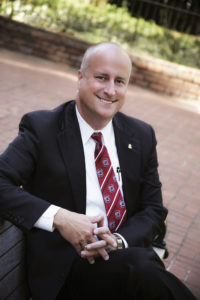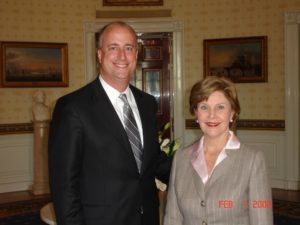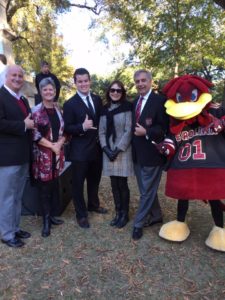Profile: Jack Claypoole’s Journey Home
Published on October 16, 2018, at 2:05 p.m.
by Reagin Edwards.
 Picture yourself on a balcony staring at the Atlantic Ocean. The sun is starting to fade, and you are enjoying a cold beverage while watching the waves crash upon the South Carolinian shore. Suddenly your phone rings, and it is the United States drug czar calling to offer you a job in Washington, D.C., to work for the Executive Office of the President. Sounds pretty surreal, but this is exactly what happened to Jack Claypoole.
Picture yourself on a balcony staring at the Atlantic Ocean. The sun is starting to fade, and you are enjoying a cold beverage while watching the waves crash upon the South Carolinian shore. Suddenly your phone rings, and it is the United States drug czar calling to offer you a job in Washington, D.C., to work for the Executive Office of the President. Sounds pretty surreal, but this is exactly what happened to Jack Claypoole.
The Office of National Drug Control Policy does not often call people and offer them jobs on a whim. Claypoole’s career leading up to that phone call consisted of several years climbing the ladder at the Lexington/Richland Alcohol and Drug Abuse Council (LRADAC) in Columbia, South Carolina, working as a deputy director for the state’s Department of Alcohol & Other Drug Abuse Services and directing public and government relations for the American Lung Association.
Education and early career
Like most people, Claypoole had to put in effort to get where he is today. According to him, it all started with an exceptional education at The University of South Carolina in Columbia. He majored in public relations in the journalism school and minored in business.
Claypoole said the combination of his communications and business education resulted in a smart decision on his part. “I got the bug for knowing how to do communication strategies very well … so being able to take the business and journalism side worked out pretty well for me,” he explained.
Claypoole graduated from USC in 1987. During his time as a student, he became heavily involved in the PRSSA chapter there. He elaborated on his experience with the Bateman Case Competition his chapter took part in: “1986-87 when I was on the team, we were given a crisis management competition to deal with. The crisis was someone had received HTLV3, a disease, from a blood transfusion from a public blood bank in Detroit, Michigan. …. HTLV3 was a variant of a disease that we did not understand, that eventually became known as AIDS/HIV.” This experience gave him some of the tools needed to be a successful communicator, and Claypoole eventually became the president of the USC PRCA chapter for the ’96-’97 year. In 1991 he obtained his Accredited in Public Relations certification.
Later in his life, Claypoole obtained an Executive Master’s in Leadership degree at Georgetown University through the McDonough School of Business. Claypoole noted that the university realized that it needed to not only create business-savvy leaders, but also leadership-savvy and morally centered leaders. The leadership master’s program stripped away the numbers and the business aspects and added in critical thinking, coalition alliance building and lessons on making decisions under pressure.
To Claypoole these lessons made a lasting impression, especially with his communications background. “Good leaders have to know how to be good communicators. … It doesn’t mean that as a communications professional you have to be a great orator, but what it means is that you have to have a sense of recognizing how to communicate with people, where they are, when they are, how they are, in a way that gets them to respond,” he explained.
Climbing the ladder at LRADAC
Claypoole began his long career in the alcohol and drug abuse prevention field at LRADAC in 1993 as a policy development coordinator. After becoming the deputy director, Claypoole was approached by the South Carolina cabinet director with a job offer. Claypoole took the job as deputy director for the state’s Department of Alcohol & Other Drug Abuse Services.
After Claypoole worked almost two years for the state, LRADAC asked him to come back as CEO of the organization. This became a huge milestone in Claypoole’s career, and public relations played an integral part in his success at LRADAC.
“We got involved from everything from branding to crisis management,” Claypoole said. “People could truly find themselves in a medical crisis, and we had a full medical staff ready to go. But at the same time we also launched alcohol enforcement teams that had never existed in South Carolina, created multi-jurisdictional task forces, re-racked how we ran budgeting and management of the organization to put more money into prevention, intervention and treatment. We did all those things, truly in a way, that if communications had not been at its core, we would have left people behind.”
There were a lot of firsts for LRADAC under the direction of Claypoole. “We launched the first adult and adolescent drug court in the state of South Carolina; we were doing the first treatment programming inside the department of corrections in South Carolina,” he said.
What he is most proud of during his tenure, however, was the agency being named the Best Managed Not For Profit in South Carolina by the South Carolina Association of Non-Profit Organizations. “We really worked hard to change the business and the culture, and sound internal and external communications strategies paved the way.” he said.
He highlighted the importance of driving an industry by using strategic thought as the catalyst. “A business innovation approach really is a communications market-driven approach. So instead of letting the practice of the industry drive where the industry goes, you need strategic thought to make it happen,” he noted. Claypoole went on to serve as CEO of LRADAC for six years before he received his call to Washington, D.C.

The call to Washington
Claypoole helped pioneer an effort in South Carolina for alcohol and drug enforcement. This effort focused on the communities of South Carolina, and required innovative data to understand it all. In 2005 John Walters, President George W. Bush’s drug czar, caught wind of Claypoole’s work in South Carolina. Walters’ staff coordinated a trip to Columbia to figure out what South Carolina was doing that was so successful; that trip to Columbia finally took place in April 2005.
After the visit to South Carolina, Walters flew the Claypoole family to D.C. to spend some time at the White House in August of that same year. Walters tried to get Claypoole to move to D.C. to start working with his office. He hesitated to take the job. Claypoole worried that he wouldn’t like the position, and that it would be impossible to get his old job back.
“Long story short, after conversations about the possible move, the LRADAC board of directors offered a leave of absence for me, giving my family and me the peace of mind necessary to make the decision to move,” Claypoole explained.
While Claypoole spoke at a methamphetamine summit down in Myrtle Beach for police officers in the area, he got the call from the U.S. drug czar’s office to come to Washington. Claypoole moved and started working at the end of March 2006, and his wife and son joined him at the end of June.
Claypoole spent a little over six years in Washington working for the White House in the Office of National Drug Control Policy. He outlasted the six people who preceded him in this position. Claypoole touched on how his communications background influenced a change of perspective on the U.S. government and other nations’ governments.
“From a communications standpoint, you really begin to appreciate how your view of reality can be skewed by the media you consume. Whether it was domestically or internationally, the opportunity to work with great community leaders, great law enforcement leaders, great elected officials, you gain an understanding that the strength of our nation isn’t congress, or the White House; it’s community by community,” Claypoole said.
Claypoole got to partake in some incredible moments while in D.C. He enjoyed flying in F-16s and helicopters, as well as meet world leaders and converse with them. From a public relations standpoint, Claypoole’s time at the White House was more about the outcome of his work than choosing which side of the aisle you align with.
“We really did a phenomenal job with drug policy in both administrations I served (President George W. Bush and President Barak Obama) helping communities get stronger, healthier and safer,” Claypoole said. “As a communications professional, you have to be able to straddle the line between your publics and your organization so that you can translate one to the other equally well. So, great PR people aren’t folks who spin truth; they are people who know how to speak truth to power in ways that can create a better result.”
The journey back home
Through his entire career, Claypoole managed to stay connected to the political field, whether in South Carolina at the State House or in D.C. at the White House. By his fifth or sixth year in D.C., Claypoole realized that politics would always get in the way of him wanting to do things right and make things better. He concluded that the parties were too averse to taking on big tasks and changes, because those were the things that cost votes. At the time, Claypoole helped with initiatives at the community level for many universities across the U.S., many of which offered him jobs. However, he chose to return to the University of South Carolina.
Coming back to his alma mater, Claypoole longed to make a difference. “I could use my experience and my voice and help us to train the next generation of leaders to be daring, smart and great communicators,” he explained. “I could help them to be unafraid of public opinion, and focused on real problems that needed real solutions.” After chatting with trusted friends, Claypoole knew that the vehicle to get him back to USC meant coming back as the head of the alumni association, My Carolina.
He started competing for the job, and he was the only finalist who was a Gamecock. USC hired him for the position and at his first day on the job in 2012, Claypoole sat in a three-hour meeting discussing the plans for a new, privately funded, alumni building on campus. The goal was to build a home for My Carolina on campus, since it didn’t yet have one. By 2013 a funding model was developed, a $26 million facility was designed in five months, the building was built in 15 months, and the project finished at $1 million under budget.
This building became the cornerstone for Claypoole’s vision at My Carolina. “We wrote the business plan for what alumni associations can do,” he said. “They have to do more than just ask people for money, because that just burns all of your communication channels. Nobody wants to open mail from your university, answer phone calls or even open emails because they are convinced all they want is their money.”
In the new alumni building, that My Carolina currently occupies, Claypoole pitched a strategic plan to the board to re-vamp the association’s communications tactics. This plan eventually received approval, and when Claypoole felt like he had completed his goals, he decided to step down as the My Carolina director in February 2018.
Leadership style
At My Carolina, Claypoole hired longtime friend Kevin Grindstaff to be the deputy executive director for Alumni Center Operations. Grindstaff was approached in 2001 by Claypoole to do some contracting work at LRADAC, “so the professional relationship really started there; then after about two and a half years he hired me full time at LRADAC,” Grindstaff said.
They stayed in touch when Claypoole went off to D.C., so they had regular interactions together over the years. Claypoole and Grindstaff continued to have a professional relationship because Claypoole wanted to keep up with things happening back in South Carolina.
“His involvement with the program was really what drew our professional relationship closer, because he was very engaged in what we were doing,” Grindstaff said.
Claypoole reached out to Grindstaff to let him know he intended to come back to USC. Claypoole also wanted to know if he would be willing to help him with the alumni facility project. Claypoole hired Grindstaff after the completion of the alumni building design, and Grindstaff worked closely with the architects, designers and general contractors for the building. He oversaw construction of the facility on a daily basis, and approved of the interior furnishings, decor and technology.
Two weeks prior to the opening of the new alumni building, South Carolina experienced a thousand-year flood. This natural disaster brought the opening of the alumni building to a screeching halt, because the town of Columbia ended up without drinkable water for a week.
Claypoole became responsible for mobilizing Gamecock alumni around the states to help with flood relief. Grindstaff recalled the event and how Claypoole worked to help preserve his city.
“The organization did not have a plan that said ‘here is how we handle disaster relief,’ but the willingness to help takes leadership to really get that going,” Grindstaff noted. “One thing about Jack I really admire is his willingness to get his hands dirty and get involved. He can identify when staff needs to do things, but he also has a willingness to jump in and help as well.”

Claypoole’s leadership abilities really shined bright during the flood relief. He even drove a forklift to help unload pallets of water bottles shipped in on a truck to help with the drinkable water problem. “I’m pretty sure that wasn’t in my job description,” Claypoole said jokingly. “It doesn’t matter what your title is in the organization; if you don’t approach it from a leadership standpoint, you are going to fail.”
A successful homecoming story
South Carolina seemed to always be calling Claypoole home. Currently, Claypoole serves as the executive director for strategic initiatives at USC. USC’s core beliefs and morals are some that Claypoole has really taken to heart over the years.
“How we respond to people who believe differently than us is a true test of what our moral character is,” Claypoole said. “It takes being able to encompass a great idea with thoughtful, appropriate communications, and a strategy of delivering those communications that can bring people together and motivates them to good dialogue. … That’s one of the neatest things about USC and being in higher education.”
For the future, the sky continues to be the limit for Claypoole. His passion for higher education has become a huge driving force in his life, and he looks to enhance it even more.
“I want to redesign how we deliver the business of higher education, and I want South Carolina to be the model for how we do it better, without having to keep raising tuition,” Claypoole said. “I spend most of my down time trying to figure out how we can do the business of education differently.”
Claypoole wants to raise PR professionals to have the discipline to not accept things at face value. “Once you become a great communicator … you have to figure out how to apply it. Being a good communicator and PR professional means that you really have to have a lot of discipline — discipline to do your job and someone else’s, so you can help them be successful as well.”




